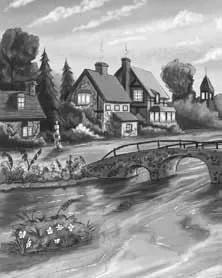语步步高
2018-03-12张新峰供稿
张新峰供稿
功 ◆ 能 ◆ 口 ◆ 语
英文中常用“Excuse me, could you please...?”“Could you tell me where...?”作为表达“询问有关信息或遵循指示”的礼貌用语,在现实生活中非常实用,下面就让我们一起“Get around”吧!

一、常用表达⇁
1. —Excuse me, could you please tell me how to get to the bookstore?
劳驾,可以请你告诉我怎样去书店吗?
—Sure, just go along Main Street until you pass Center Street.
The bookstore is on your right, beside the bank.
当然。沿着主街道走,直到中心街道。书店就在你的右边,银行的旁边。
2. —Do you know when the bookstore will close today? 你知道今天书店何时关门吗?
—It will close at 7 p.m. today. 今晚七点关门。
3. —Oh, could you tell me where the restrooms are? 哦,请问哪儿有洗手间?
—Well, I’m sorry to tell you there is no restroom. 呃,很抱歉,这附近没有洗手间。

4. —I wonder when the park closes today. 我想知道停车场今天何时关门。
—Nine thirty, so you don’t need to rush! 九点半,所以你不必着急!
5. —Excuse me, do you know where I can get some postcards?
请问一下,你知道在哪儿能买到明信片吗?
—Sure. There’s a post office between the bank and the supermarket.
当然。在银行和超市之间那家邮局。
6. —Can you tell me when the band starts playing this evening? 你能告诉我乐队今晚何时开始演奏吗?—It starts at 8 p.m. 晚上八点开始。
7. —Could you tell me how to get to the post office? 你能告诉我怎么去邮局吗?
—Sorry, I’m not sure how to get there. 很抱歉,我不知道怎么去那儿。
8. —Excuse me, could you please tell me where the nearest bank is?
劳驾,你能告诉我最近的银行在哪儿吗?
—Sure. You go east along this street. It’s between the bookstore and the restaurant.
当然。沿着这条街往东走,就在书店和餐馆之间。

9. —Pardon me, could you please tell me where to park my car? 劳驾,您能告诉我哪儿能停车吗?—Sure. There’s an underground parking lot over there. 当然。那边有一个地下停车场。
10. —Excuse me, do you know where I can buy some medicine? 请问,你知道在哪儿能买到药吗?—Sure. There’s a drugstore down the street. 当然。沿着这条街走下去有一家药店。
二、对话演练⇁
从方框中选出合适的选项补全对话,其中有两项是多余选项。
A. I will go to the History Museum.
B. You’re welcome.
C. Can I take a bus?
D. How long will it take me to walk there?
E. That’s such a pity!
F. Where is the bus stop?
G. Could you tell me the way to the History Museum?

口 ◆ 语 ◆ 一 ◆ 点 ◆ 通
1 No wonder! 难怪!
B: Certainly. Go along this street, turn left into Xingfu Street, and the museum is on your right.
B: It’s about thirty minutes.
B: Yes, you can. A No.103 bus will take you there.
B: Over there. Look! The bus is coming.
A: Thank you very much.
A: Jack’s been looking unhappy lately. 杰克最近看起来闷闷不乐的。B: His girlfriend broke up with him. 他女友和他分手了。
A: No wonder! I’d be unhappy, too. 难怪!换成是我,也会不快乐的。
【常用口语】
Of course! 对,当然(对别人刚说的话表示接受或同意)
【特别提醒】

“No wonder!”中的wonder作名词用,表“惊奇,诧异”,有时与动词work并用,表“产生奇迹,有效”。例如:
That medicine really worked wonders. 那种药真的很灵。=That medicine really worked miracles.
此外,wonder亦可作及物动词用,表“不明白,想知道”,其后常接疑问词。例如:I wonder if he can do it. 我想知道他能不能做。
I wonder what he’s doing. 我想知道他在做什么。
2 That explains it. 原来如此。

有人对我们诉说一件事情,若我们仍有不甚明了之处,对方再加强补述,这时我们再弄清楚时,则可使用本句。A: Susan, I haven’t seen you in the pub for a long time.苏珊,我有好长一段时间没有在酒吧里看到你了。
B: I have a part-time job now, so I work in the evenings.
我目前有份兼职工作,所以都在夜晚上班。
A: That explains it. 原来如此。
【常用口语】
Now I understand. 现在我了解了。I see. 我知道了。
【特别提醒】
上列对话中,“a part-time job”表“一份兼职性工作”,注意part-time与full-time均为形容词,亦可用作副词,中间都有连字符连接。例如:
He is a full-time teacher in our school. 他是我们学校的专职老师。(作形容词)He works full-time in our company. 他在我们公司做全职工作。(作副词)
3 Is that right? 是那样吗?
我们对于某人所说之事感到不确定而怀疑时,可使用本句来质疑对方。本句与“Are you sure?”意思相当。
A: There’s a typhoon coming. 有台风要来。
B: Is that right? 是吗?
A: That’s what the weatherman said last night. 昨晚气象播报员是那么说的。

【常用口语】
Is that so? 是这样吗?Oh, yeah? 噢,是吗?Really? 真的吗?
【特别提醒】
英文里表“台风要来”,除了用“There’s a typhoon coming.”之外,还可以用下列说法:
A typhoon is coming.
= A typhoon is approaching.
= A typhoon is near at hand.
= A typhoon is around the corner.
4 What do you think? 你怎么看?
当我们面临一件事情感到不知所措,或是不确定自己的方法是否正确可行时,可使用本句,以征询对方的意见。
A: I think this painting would look good in our living room. What do you think?
我觉得这幅画挂在咱们客厅里会很好看。你觉得呢?
B: Sure. Let’s buy it. 当然。咱们买下来吧。
【常用口语】
What’s your opinion? 你的意见呢?What’s your idea? 你有何高见?What do you say? 你觉得呢?
【特别提醒】

本句亦可表“征询对方对某人或某事的意见”,此时使用“What do you think of+人或事?”的句型。例如:
What do you think of John? 你对约翰的看法如何?
What do you think of this movie? 你觉得这部电影怎么样?
= How do you feel about this movie?
= How do you like this movie?
可千万不要说成:
How do you think of this movie? 你如何想这部电影?(×)
